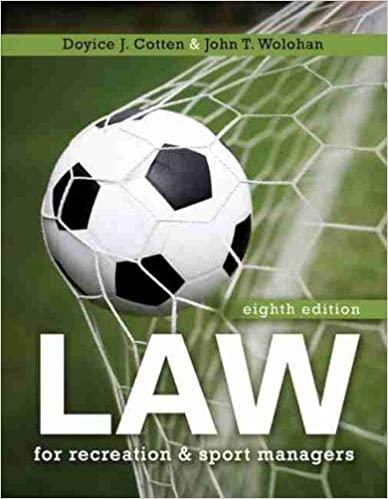Question
Background and Facts Lou Sisuphan was the director of finance at a Toyota dealership. Sisuphan complained repeatedly to management about another employee, Ian McClelland. The
Background and Facts
Lou Sisuphan was the director of finance at a Toyota dealership. Sisuphan complained repeatedly to management about another employee, Ian McClelland. The general manager, Michael Christian, would not terminate McClelland "because he brought a lot of money into the dealership." In an attempt to get McClelland fired, Sisuphan took and kept an envelope containing a payment of nearly $30,000 from one of McClelland's customers. McClelland believed the envelope had been deposited in the company's safe.
Later, Sisuphan told the dealership what he had done and returned the money, adding that he had "no intention of stealing the money." Christian fired Sisuphan the next day, and the district attorney later charged Sisuphan with embezzlement. After a jury trial, Sisuphan was found guilty. Sisuphan appealed.
In the Words of the Court
JENKINS, J. [ Judge]
* * * *
Fraudulent intent is an essential element of embezzlement. Although restoration of the property is not a defense, evidence of repayment may be relevant to the extent it shows that a defendant's intent at the time of the taking was not fraudulent. Such evidence is admissible "only when [a] defendant shows a relevant and probative [supporting] link in his subsequent actions from which it might be inferred his original intent was innocent." The question before us, therefore, is whether evidence that Sisuphan returned the money reasonably tends to prove he lacked the requisite intent at the time of the taking. [Emphasis added.]
Section 508 [of the California Penal Code], which sets out the offense of which Sisuphan was convicted, provides: "Every clerk, agent, or servant of any person who fraudulently appropriates to his own use, or secretes with a fraudulent intent to appropriate to his own use, any property of another which has come into his control or care by virtue of his employment * * * is guilty of embezzlement." Sisuphan denies he ever intended "to use the [money] to financially better himself, even temporarily" and contends the evidence he sought to introduce showed "he returned the [money] without having appropriated it to his own use in any way." He argues that this evidence negates fraudulent intent because it supports his claim that he took the money to get McClelland fired and acted "to help his company by drawing attention to the inadequacy and incompetency of an employee." We reject these contentions.
In determining whether Sisuphan's intent was fraudulent at the time of the taking, the issue is not whether he intended to spend the money, but whether he intended to use it for a purpose other than that for which the dealership entrusted it to him. The offense of embezzlement contemplates a principal's entrustment of property to an agent for certain purposes and the agent's breach of that trust by acting outside his authority in his use of the property. * * * Sisuphan's undisputed purpose to get McClelland firedwas beyond the scope of his responsibility and therefore outside the trust afforded him by the dealership. Accordingly, even if the [submitted] evidence shows he took the money for this purpose, it does not tend to prove he lacked fraudulent intent, and the trial court properly excluded this evidence. [Emphasis added.]
Answer this questions with explanation
Who are the parties in this case?
What went wrong - why are they in court?
What court is the opinion from - is it a trial court or appellate court?
What question did the court have to decide in this case?
What facts did the court focus on in deciding the case?
Step by Step Solution
There are 3 Steps involved in it
Step: 1

Get Instant Access to Expert-Tailored Solutions
See step-by-step solutions with expert insights and AI powered tools for academic success
Step: 2

Step: 3

Ace Your Homework with AI
Get the answers you need in no time with our AI-driven, step-by-step assistance
Get Started


